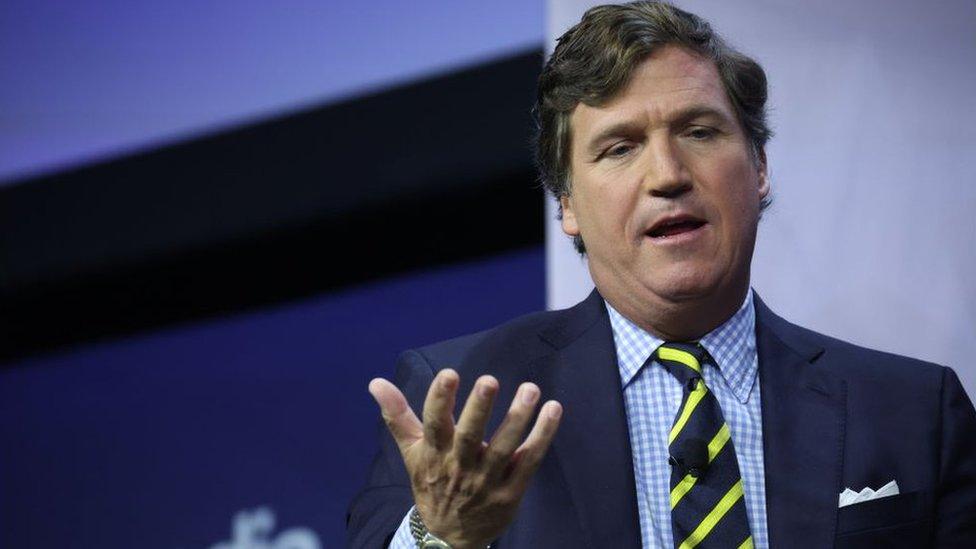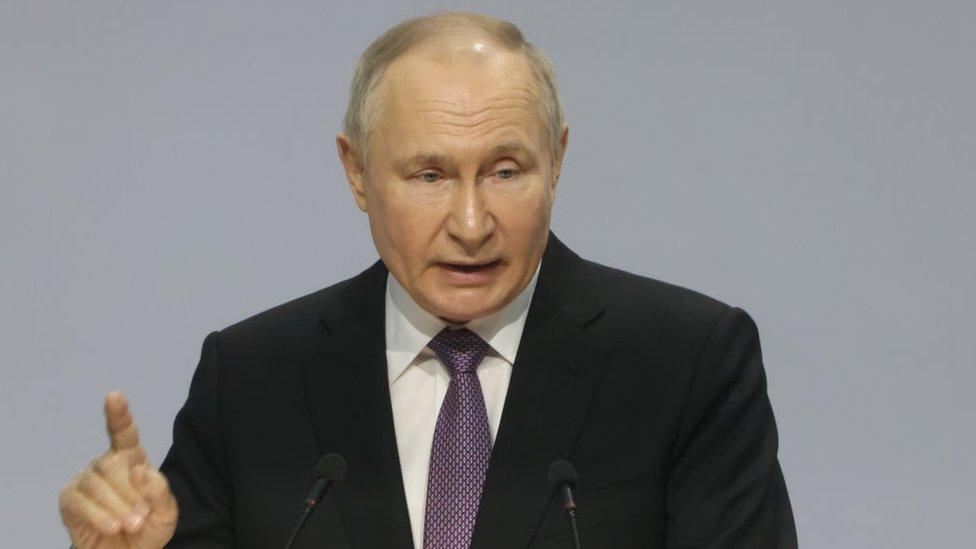What do Vladimir Putin and Tucker Carlson gain from Moscow interview?
- Published

Russian President Vladimir Putin's highly anticipated interview with conservative US media personality Tucker Carlson has aired.
The interview, which was recorded on Tuesday, was posted on Carlson's website and X, formerly known as Twitter.
The high-profile sit-down marks the first time the Russian leader has agreed to an interview with a Western media outlet since he launched his full-scale invasion of Ukraine almost two years ago and comes as fighting in the country has reached a stalemate.
Carlson introduced the interview in front of a snowy Kremlin and said it had been recorded two days before.
Prior to the interview, he falsely claimed that other journalists were uninterested in talking to the Russian leader and that "not a single Western journalist has bothered to interview" Mr Putin since the invasion of Ukraine.
Countless reporters from Western countries, including the BBC's Russia Editor Steve Rosenberg, have sent the Kremlin repeated interview requests. None of these have been granted.
Kremlin press secretary Dmitry Peskov himself admitted that Carlson was incorrect during a news briefing on Wednesday, telling the BBC in Moscow: "Mr Carlson is not correct, and he couldn't have known that. We receive a lot of requests for interviews with the president."
But the interview is a major coup for Carlson, who has rebounded rapidly since he was spectacularly fired by Fox News last year, after reportedly falling out of favour with owner Rupert Murdoch. It allows him to present his new media company, which launched on X last year, as a major player in the media landscape.
During the interview, Carlson pushed for the release of Wall Street Journal reporter Evan Gershkovich, asking Mr Putin if he "would be willing to release him to us and we'll bring him back to the United States".
Mr Putin said he believed a deal could be struck to release Mr Gershkovich, 32, "if our partners take reciprocal steps".
Carlson's visit has come at an opportune time for the long-time Russian leader, whose media appearances are tightly choreographed and controlled by the Kremlin.
In the US, attempts to pass legislation granting new military aid for Ukraine - widely viewed as essential to continuing the war - have stalled in Congress. On Wednesday, the latest bill that would have allocated $60bn of crucial funding for Kyiv was advancing through the Senate but faced stiff opposition from Republicans in the House.
In the absence of fresh military aid, Ukraine's attempts to drive Russian forces from the country and launch new counter-offensives in the south and the eastern Donbas region have proved practically impossible.
Some senior Republicans, including the party's Senate leader Mitch McConnell, remain committed to forcing through that new aid. But they face increasing hostility from hard-right members of their own party, who have baulked at the spiralling cost of the conflict and are pushing against US involvement in global conflicts.
The Kremlin will be hoping that, by doing an interview with a prominent conservative TV presenter, Republican lawmakers will be susceptible to Moscow's narratives usually only parroted within domestic Russian media. Carlson has also had a long and mutually beneficial relationship with Donald Trump, the presumptive Republican presidential nominee, who has expressed scepticism about supporting Ukraine.

Vladimir Putin has eschewed interviews with Western outlets since his invasion of Ukraine in February 2022
Carlson's platform offers an opportunity for the Kremlin to reach a wider, potentially sympathetic and heavily conservative audience in the US. In the past, the former Fox News host has launched scathing attacks on Ukrainian President Volodymyr Zelensky and allied himself with Mr Putin's drive to embrace so-called "traditional values," a phrase which has included attacks on LGBT people in Russia.
Kremlin spin-doctors also have an eye on Europe, which will be left to support Ukraine financially if America withdraws assistance.
Politics on the continent are changing. Surveys show increasing levels of hesitancy among the European public about continuing support for Ukraine. A number of right-wing populist parties, some of them with pro-Russian leanings, have had success in elections in various countries. Others, including in economic powerhouses like France and Germany, are doing well in the polls.
But there is also a domestic element to the proceedings. Russia will hold presidential elections next month, and while the contest is almost certain to be won by Mr Putin - with his sole anti-war challenger disqualified on Thursday - the interview with Carlson allows the Russian leader to present himself as an international statesman with a global presence to his home audience.
Indeed, Russian state media have spent several days treating Carlson as a major celebrity. In breathless coverage, state TV followed the media personality's arrival and broadcast footage of various trips to restaurants and a visit to see the Spartacus ballet at the Bolshoi Theatre.
Finally, Moscow will be closely watching growing signs of internal political divisions in Ukraine.
On Thursday, President Zelensky said he was replacing his top military commander, Gen Valery Zaluzhny, amid rumours of a rift between the two men. That will be music to Mr Putin's ears - his ultimate goal, short of the military conquest of Ukraine, is the removal of the Zelensky government in order to replace it with a pro-Russian one under his control.
Failing that, the Kremlin leader is hoping Europe and America will tire of the war and put pressure on the Ukrainians to begin negotiations to end the conflict on terms that would be favourable to Moscow.